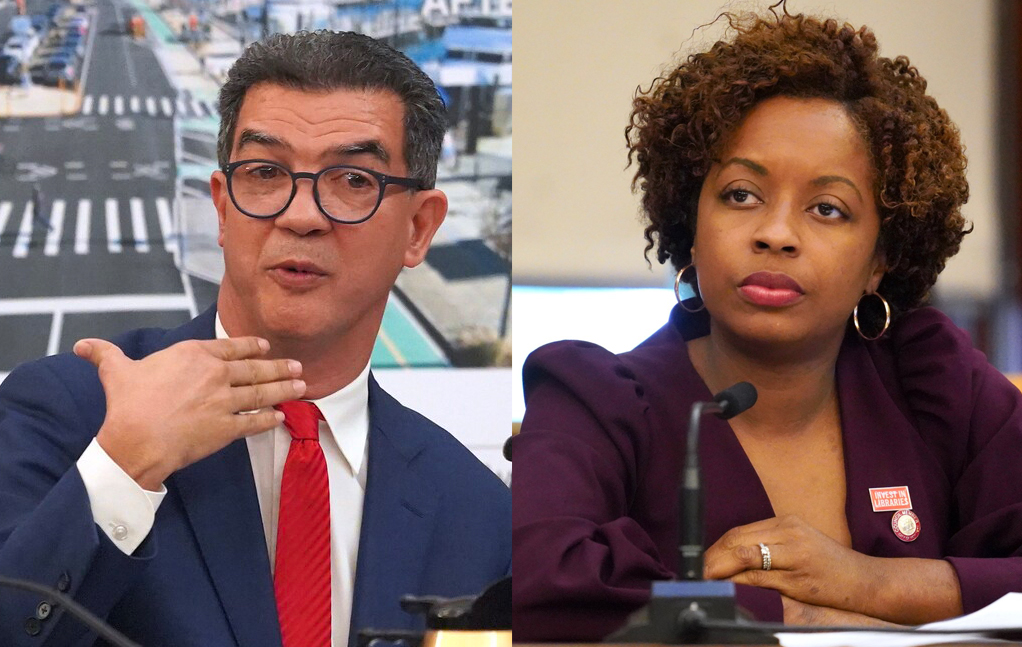The dog ate the DOT's homework.
In a testy Council hearing on Tuesday, the Department of Transportation declined to answer a simple question from Transportation Committee Chair Selvena Brooks-Powers: How many bus and bike lane miles have you built so far this year?
oh my ... in 1st Q at this hearing, @CMBrooksPowers asks how many of the required 30 miles of protected bus lanes the city has built out so far this year & DOT reps decline to answer, saying the work is constantly ongoing, will give mandated update in February https://t.co/7XO9ysOjrk
— Ben Max (@TweetBenMax) September 12, 2023
DOT Commissioner Ydanis Rodriguez — who once would have been the interlocutor when he was the Council's Transportation Committee Chairman until then end of 2021 — immediately turned it over to Deputy Commissioner Eric Beaton to answer Brooks-Powers's simple question:
"Because we're working very hard every day to deliver fast improvement and all of the other strategic planning elements, I don't have a number of for you today," Beaton said. "Because we are actually everyday doing more and more what we would like to do..."
Brooks-Powers cut him off: "What's the number?"
Beaton continued, "...so, we I don't have a current number."
"But you kind of expected that we'd be asking that question, but you have no information to give to this committee?" Brooks-Powers shot back.
Beaton explained that many "big projects" finish at the end of the year, so "we don't think that providing a day-by-day update is an accurate representation of the work." DOT in the past has said that a bus lane tracker created by the Riders Alliance and a bike lane tracker created by Transportation Alternatives are inaccurate.
The exchange came after a long preamble in which Brooks-Powers restated what the Adams administration is required to do under Local Law 195, which created the requirement of a five-year "Streets Master Plan" including 30 miles of "protected bus lanes" and 50 miles of protected bike lanes this year and annually going forward.
"DOT has struggled to meet its legal mandate. In 2021, DOT installed just 4.4 miles of bus lane — well below 20-mile requirement ... and it installed 26.3 miles of the 30-mile requirement," she said. The city is far off this year's goals, and had privately said it can't meet them, Streetsblog has reported.
"These shortfalls remain concerning," she said.
Rodriguez said the agency would provide the final numbers early next year, but Brooks-Powers was undeterred.
"DOT was aware that we had this hearing; they were aware for a long time [and to] come unprepared, I think is unacceptable," she said, once again asking Rodriguez, point blank, if the agency would meet the bus lane requirement of 30 miles.
He hemmed — "Last year, we didn't..." — and then hawed, "We have a goal at DOT to [get] over that. And this is deep to my heart because I was a co-sponsor of the [Streets Master Plan] bill. But I say to get to those numbers that we have as a goal requires a lot."
But then he also went on the offensive, saying that the DOT needs the help of Council members, many of whom — including, ironically, Brooks-Powers — have opposed street safety improvements such as bus lanes (as she did on Jamaica Avenue in 2022).
"Without that level of participation, most likely we will not get to those goals," he said, citing the agency's efforts to build a bus lane on Fordham Road that is opposed by Council Member Oswald Feliz, though Rodriguez did not name him publicly.
The dig against the Council was not lost on Brooks-Powers, who shot back that the 30 miles of bus lane and 50 miles of bike lanes is "not a goal — it's legal mandate."
Another factor in DOT's slow rollout of project is the Covid-era city staffing crunch. The division in charge of bus and bike lane projects is down 14 percent compared to before the pandemic, according to DOT.
Privately, DOT sources are quick to point out that Brooks-Powers and her colleagues are themselves impediments to street safety and bus lane plans. Council Member Farah Louis used her time to complain about bike lane projects that, she claimed, "block" driveways. And Brooks-Powers later complained about a capital plan on Beach 108th Street in her district.






